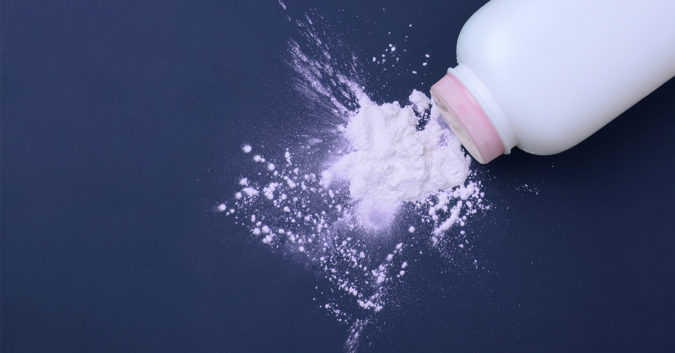In August 2022, health care giant Johnson & Johnson (J&J) announced it will halt all distribution of talcum-based baby powder globally in 2023. The decision comes after decades of litigation pressure and thousands of talcum powder lawsuits, as studies found its talcum powder was tainted with asbestos and linked to ovarian cancer and mesothelioma.
With talc-powder distribution canceled in North America in 2020, this is another step towards protecting consumers against dangerous products.
Get a Free Talcum Powder Case Review
What Is Talc Powder?
Talc or talcum powder is a mineral most commonly known for its usage in cosmetics and personal hygiene products, but it is also used in ceramics, paints, and even roofing materials. In its powdered form, talc absorbs excess moisture and reduces friction, leading to its incorporation in J&J’s signature baby powder product.
The mineral is sourced through mining, but because talc is a naturally occurring mineral, it is possible for asbestos to form alongside it, enabling even the smallest traces of asbestos, a known carcinogen, to contaminate talc and prove harmful to consumers.
Talcum Powder Cancer Risks
While studies have not found talcum specifically to be carcinogenic, women who frequently use talcum powder in sensitive areas may be at an increased risk of ovarian cancer. Since the 1970s researchers believe this increased risk is due to asbestos contamination in talc sources and products.
Ovarian cancer can be difficult to detect until the cancer reaches advanced stages. Its symptoms are often dismissed for other less dangerous conditions.
Symptoms of ovarian cancer may include:
- Back pain
- Bloating
- Constant fullness/trouble eating
- Constipation
- Fatigue
- Frequent urination
- Menstrual changes
- Pelvic or abdominal pain
- Stomach swelling
- Weight loss
Women experiencing these symptoms, especially those who may have used, should contact their doctor as soon as possible for proper screening.
In addition to women’s increased risk of ovarian cancer with repeated use of talcum powder, inhalation or exposure to asbestos-contaminated talc in mines or factories may lead to increased risk of lung cancer, mesothelioma, or other asbestos-related diseases.
Like ovarian cancer, mesothelioma and other asbestos-related diseases go undetected for years until the cancer has reached more advanced stages.
Other cancers linked to talcum powder include:
- Stomach cancer
- Uterine cancer
- Other forms of cancer and serious illnesses
Baby Powder Lawsuits Lead to Consumer Compensation
For decades J&J knew of the risks associated with its talcum powder products, yet the health care giant continued to cut proper testing and refused to put warning labels on its products. For years, the company silently settled thousands of lawsuits and made no commitment to change.
In 2019, the U.S. Food and Drug Administration (FDA) detected asbestos in several batches of its signature baby powder. Despite efforts to dispute the FDA findings, the company recalled thousands of baby powder bottles from shelves.
With mounting lawsuits and more evidence of asbestos contamination from FDA studies, J&J halted sales of talcum-based baby powder in North America, switching entirely to cornstarch-based products.
Finally, the decision this year to halt distribution of its dangerous talcum powder products globally is another step toward consumer safety and protections.
However, J&J continues to dodge accountability for the known dangers of its products. Instead, they claimed the decision was to “simplify product offerings and meet evolving global trends.”
Talcum Powder Lawsuit Compensation
It wasn’t until recently that J&J was finally held accountable for its negligence. According to the New York Times, more than 40,000 lawsuits have been filed over the years to pursue compensation for victims of J&J’s negligence.
In 2016, J&J lost its first talcum powder case when a woman in Alabama, who developed ovarian cancer from using J&J’s baby powder, won $72 Million in compensatory damages. Since that ground-breaking litigation, several multimillion-dollar jury verdicts have been delivered against J&J talcum powder across the U.S.
In a landmark case in 2018, a jury delivered a $4.7 Billion verdict siding with 22 women who developed cancer after talcum powder usage. While J&J’s appeals have since reduced the verdict to $2.1 Billion, the company continues to fail in reducing the compensatory damages owed to victims.
In anticipation of more lawsuits, J&J set aside $3.9 Billion in 2021 for more victims of its talcum powder. This figure was double what the company initially set aside in 2020.
Victims of J&J’s unsafe products have more access to compensation than ever before — compensation that can help pay for costly treatments.
Get Help Holding Johnson & Johnson Accountable
While the decision to halt the distribution of talc powder globally is a step in the right direction toward protecting consumers from the harmful effects of J&J products, the decision comes after decades of J&J’s negligence.
J&J and other large manufacturers knew about the risks for decades but put profit over safety. Thousands of consumers have already been exposed and, with J&J not recalling the remaining talc products on the shelves, thousands more could be at risk of exposure.
If you used these products or worked in a J&J talcum powder factory or manufacturing plant and have developed mesothelioma, ovarian cancer, or uterine cancer, you may be eligible to file a talcum powder lawsuit.
Call Sokolove Law at (800) 995-1212 or start a free legal case review to learn more about pursuing compensation for your injuries.
